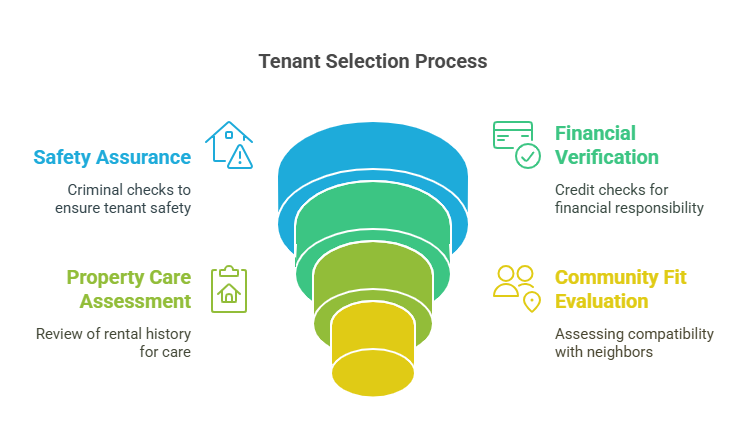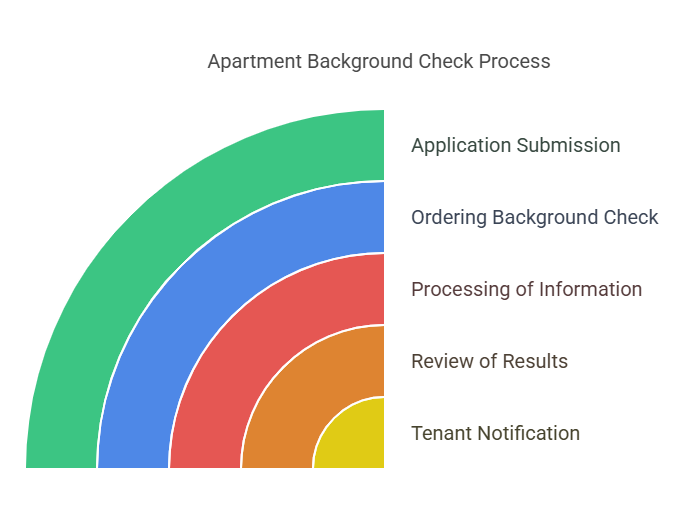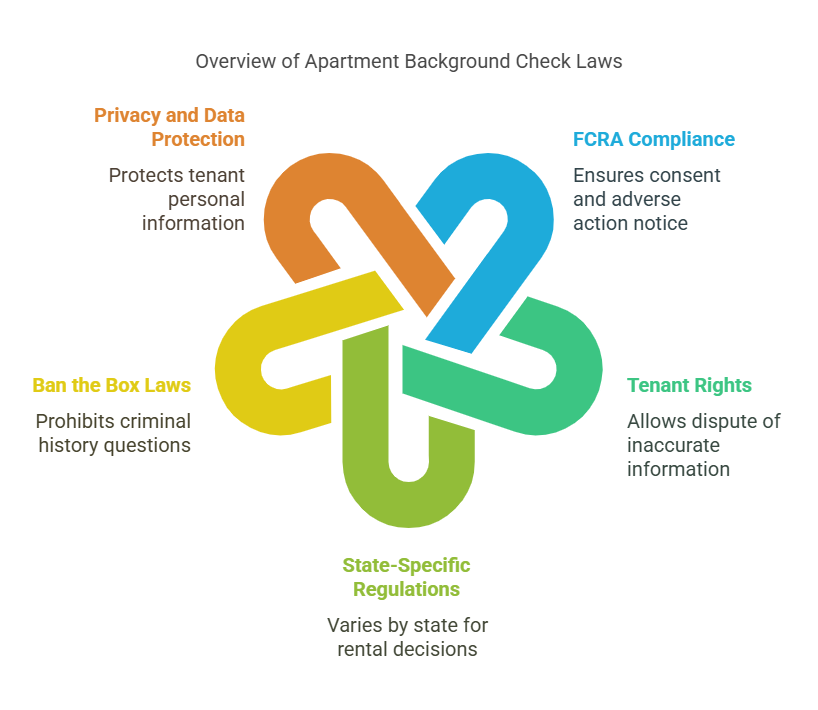The Timeline of Apartment Background Checks Explained

What is a Background Check for an Apartment?
Apartment Background Check is a critical step in the tenant screening process conducted by landlords or property managers to assess the suitability of a potential tenant. It involves a comprehensive review of various aspects of an applicant’s background, including their criminal history, creditworthiness, rental history, and sometimes even their employment status. The goal is to ensure that the prospective tenant is financially stable, trustworthy, and responsible—key traits that landlords want in tenants who will respect the property, pay rent on time, and create a safe, positive living environment for others.
The background check process is one of the primary tools landlords use to evaluate tenants, helping them reduce the risk of leasing to individuals who may pose a threat to the property, neighbors, or the community. Without this critical step, landlords could face challenges such as late payments, property damage, or legal issues related to criminal activity or eviction disputes.
Why Do Landlords or Property Managers Require Background Checks?

Landlords and property managers require background checks to ensure they select tenants who will uphold their lease agreements and be responsible occupants of the property. Renting to the right individual is about more than just receiving rent payments on time—it’s about maintaining the safety, integrity, and harmony of the living space. Here’s why background checks are essential in the rental process:
- Ensuring Safety: One of the most important reasons for conducting background checks is to ensure the safety of the property and the people living in it. Criminal background checks help landlords identify applicants with violent or risky criminal behavior that could pose a threat to others.
- Verifying Financial Responsibility: Background checks include credit checks to ensure that tenants are financially responsible and capable of paying rent consistently. This is especially important for landlords who want to avoid dealing with late payments, collections, or evictions.
- Avoiding Property Damage and Legal Issues: By checking an applicant’s rental history, landlords can identify red flags such as previous evictions, disputes, or issues with property maintenance. This helps ensure that applicants are likely to treat the property with care and respect.
- Creating a Positive Community: For multi-unit buildings, it’s important that tenants maintain good relationships with neighbors and contribute to a positive living environment. Background checks help ensure that tenants are not only responsible but also fit within the community.
How Long Does a Typical Background Check Take?
The time it takes for an apartment background check to be completed can vary depending on several factors. On average, a standard background check typically takes anywhere between 2-5 business days to process. However, this timeline can fluctuate due to various influences, including:
- Type of Check: The type of information being reviewed can impact how long the process takes. A simple criminal background check might take less time than a full credit report check or a comprehensive rental history verification, which can take longer to obtain.
- Complexity of the Tenant’s Background: If the applicant has lived in multiple locations or has a complex financial or criminal history, the background check may take longer to complete. This is especially true if records need to be retrieved from different jurisdictions or agencies.
- Speed of the Background Check Provider: The background check service used by the landlord can also influence the timeline. Some background check providers, such as Exact Background Checks, offer expedited services to ensure quicker turnaround times, while others may be slower, especially during busy rental seasons.
- Accuracy and Completeness of the Information: If the tenant’s application or background information is incomplete, it may cause delays. Missing addresses, contact details, or discrepancies in the application can lead to additional follow-up, which can slow down the entire process.
Step-by-Step Process of an Apartment Background Check

The process of conducting a background check for an apartment involves several key steps to assess the applicant’s history and determine whether they are a suitable candidate for renting. Below is a general outline of how a typical background check works:
- Applicant Submits an Application
The first step in the process is the submission of an application. This usually includes personal information, past addresses, employment history, and consent for background checks. The applicant may also need to provide references and documents like pay stubs or identification. - Landlord or Property Manager Orders the Background Check
Once the application is received, the landlord or property manager orders a background check from a screening service. This service will retrieve information from multiple databases, including criminal records, credit reports, eviction history, and sometimes employment verification. - Processing of Information
The background check provider will gather the required information, which can include criminal history, eviction records, credit reports, and rental history. This step may involve checking various databases and communicating with former landlords or credit bureaus. - Review of Results
After the background check is completed, the landlord reviews the results to assess whether the applicant meets the rental requirements. Based on the findings, the landlord will make a decision on whether to approve or deny the application. - Tenant Notification
Finally, the applicant is notified of the decision. If the background check results in disqualification, landlords are typically required to provide the applicant with the reason for denial, especially if the decision is based on a credit report or criminal history.
Types of Background Checks for Apartments
Background checks for apartments can include various components depending on the landlord’s requirements. Each component can take a different amount of time to process, and understanding these checks can help both landlords and applicants anticipate how long the entire process will take.
- Criminal History Check
One of the most common background checks for apartments is a criminal history check. This is conducted to determine whether the applicant has any criminal convictions that may pose a risk to the property or other tenants. The criminal history check typically includes:- National and local criminal records: These include felonies, misdemeanors, and any other legal issues the applicant may have faced.
- Sex offender registry: Landlords often check this database to ensure that the applicant is not listed as a sex offender.
Duration: A criminal background check typically takes 1-3 days, depending on the jurisdiction and the complexity of the applicant’s history.
- Credit Report Check
The credit report check assesses the applicant’s financial stability and ability to pay rent. It includes details about the applicant’s credit score, outstanding debts, and payment history. A poor credit score or significant outstanding debt may disqualify an applicant, as landlords want to minimize the risk of late payments.Duration: A credit report check can take anywhere from 1-2 days, as it is generally processed by major credit bureaus, such as Equifax, TransUnion, or Experian. - Eviction History Check
An eviction history check reveals whether the applicant has been previously evicted from any rental property. Landlords are typically concerned about applicants with a history of evictions, as it may indicate a pattern of irresponsibility or difficulty in adhering to rental agreements.Duration: An eviction check generally takes 1-3 days. It involves contacting prior landlords or checking with court records, which may take varying amounts of time depending on the location. - Rental History Verification
A rental history verification involves contacting previous landlords or property managers to verify the applicant’s rental behavior. This check typically covers rent payment history, property maintenance, and any issues such as complaints or disputes.Duration: Rental history verification can take 2-5 days, as it depends on the responsiveness of former landlords or property managers. - Employment and Income Verification
Some landlords may require employment verification or proof of income to ensure that the applicant has a stable job and sufficient funds to pay rent. This may include reviewing pay stubs, tax returns, or contacting the employer directly.Duration: Employment verification typically takes 1-2 days, though delays can occur if the applicant’s employer is slow to respond.
How Long Does Each Type of Background Check Take?
Below is a summary of the average time it takes for each type of background check, providing tenants and landlords with an overview of the expected duration:
| Background Check Type | Average Duration |
|---|---|
| Criminal History Check | 1-3 days |
| Credit Report Check | 1-2 days |
| Eviction History Check | 1-3 days |
| Rental History Verification | 2-5 days |
| Employment & Income Verification | 1-2 days |
Factors That Can Cause Delays
Several factors can influence the duration of an apartment background check and lead to delays:
- Incomplete or Incorrect Information
If the applicant provides incorrect or incomplete information on their application, it can cause delays as the landlord or background check provider may need to follow up to correct the errors. - Discrepancies in Records
If there are discrepancies in the applicant’s criminal or credit records (such as a common name, mistaken identity, or outdated information), the background check provider may need to investigate further, extending the processing time. - High Volume of Requests
During peak rental seasons, such as summer or the start of school years, background check providers may experience higher volumes of requests, which can lead to delays in processing. - Jurisdictional Delays
If criminal or eviction records are housed in multiple jurisdictions, the process can be delayed as records may take longer to retrieve from local courts or databases.
Exact Background Checks
One of the ways landlords can expedite the background check process is by using a professional service like Exact Background Checks. These services offer fast and reliable tenant screening solutions that can reduce the time it takes to complete a background check. They also provide detailed reports, helping landlords make quick, informed decisions about applicants.
Legal Aspects of Apartment Background Checks

When conducting background checks for apartments, there are several legal considerations that landlords and tenants must be aware of. These regulations ensure that the screening process is fair, transparent, and compliant with state and federal laws. Below are some key legal aspects to consider:
- Fair Credit Reporting Act (FCRA) Compliance
The Fair Credit Reporting Act (FCRA) governs the use of consumer credit reports and background information. It requires that landlords obtain written consent from applicants before conducting a background check. This ensures that applicants are fully aware of the screening process. Additionally, if an applicant is denied based on the information in their background check, the landlord must provide a notice of adverse action that explains why the decision was made. - Tenant Rights Under the FCRA
Under the FCRA, tenants have the right to dispute any inaccurate information found in their background checks. If an applicant believes that there is incorrect information in their criminal or credit records, they can request a correction or clarification from the reporting agency. Furthermore, applicants have the right to review their background check results and request that any errors be rectified before a final decision is made. - State-Specific Regulations
Background checks for apartments can vary by state, as individual states may have specific laws regarding the types of checks that can be conducted and what information can be used to make rental decisions. For example, some states may limit how far back criminal records can be reviewed, or they may have additional rules about the use of eviction records. Landlords must ensure that their screening process complies with the applicable state laws. - Ban the Box Laws
Several states and cities have implemented Ban the Box laws, which prohibit landlords from asking about a potential tenant’s criminal history on rental applications. These laws are intended to prevent discrimination against individuals who have past criminal records. However, while an applicant’s criminal history may not be a part of the initial application process, it can still be checked later in the background check. - Privacy and Data Protection
Tenant privacy is a critical consideration when performing background checks. Landlords must ensure that any personal information collected is protected in accordance with data protection laws. This includes securely storing background check data and ensuring that it is only accessible to individuals who need to review it as part of the rental decision process.
FAQs: Frequently Asked Questions About Background Checks for Apartments
Here are some common questions applicants and landlords may have about apartment background checks, along with detailed answers:
How long does a typical apartment background check take, and what factors can cause delays?
- A typical apartment background check takes 2-5 business days. Factors that can cause delays include the type of checks being conducted, the complexity of the applicant’s background, the speed of the background check provider, incomplete or incorrect information provided by the applicant, discrepancies in records, high volume of requests, and jurisdictional delays in retrieving records.
What are the legal aspects landlords must consider when conducting apartment background checks?
- Landlords must comply with the Fair Credit Reporting Act (FCRA), which requires written consent and provides tenants with rights to dispute inaccuracies. They should also be aware of state-specific regulations, Ban the Box laws, and ensure they are protecting tenant privacy and data.
Why do landlords require apartment background checks?
- Landlords require background checks to ensure the safety of the property and other tenants, verify the financial responsibility of applicants, avoid property damage and legal issues, and create a positive community environment.
What steps are involved in the apartment background check process?
- The process includes the applicant submitting an application with consent for background checks, the landlord ordering the checks from a screening service, the service processing the information, the landlord reviewing the results, and the applicant being notified of the decision, with reasons provided if denied.
Conclusion
Understanding the apartment background check process is crucial for both tenants and landlords. Background checks provide landlords with valuable insights into an applicant’s history, allowing them to make informed decisions about who will be living in their property. For tenants, understanding how background checks work and knowing what to expect can help navigate the rental process with confidence.
While the background check process may take anywhere from 1 to 5 days, various factors such as the type of checks involved, the responsiveness of previous landlords, and the complexity of the records being reviewed can influence the duration. Additionally, tenants must be aware of their rights under the FCRA and ensure that the background checks conducted are compliant with privacy and data protection laws.
For landlords, using professional services like Exact Background Checks can help expedite the background screening process and ensure that all the necessary information is gathered to make an informed decision. By staying informed about the legal requirements, managing tenant expectations, and understanding the timeline, both tenants and landlords can have a smoother, more efficient rental process.




Conducting a thorough apartment background check is essential for landlords to ensure they select reliable and responsible tenants. These checks help verify financial stability, rental history, and criminal records, reducing risks like late payments or property damage.